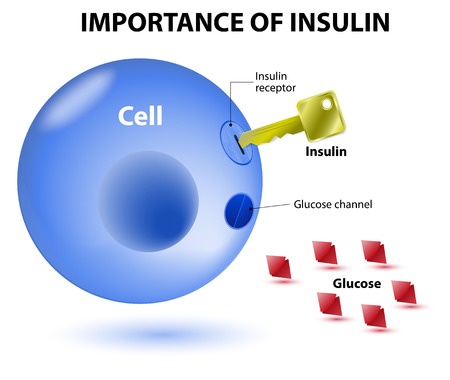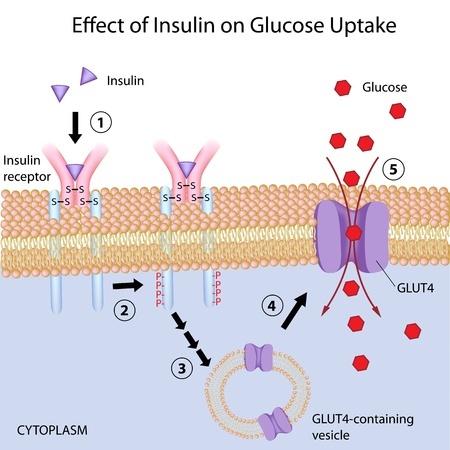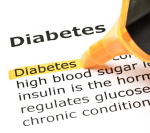
What is insulin?
Insulin is a hormone that is produced in the Islets of Langerhans in the beta cells of the pancreas. Without insulin (either made by your body or injected insulin if you do not make enough insulin on your own) you cannot maintain normal blood sugar levels and your blood sugar will go too high.
High blood sugar (hyperglycemia) can lead to many complications including blindness, kidney failure, nerve damage, heart attack, stroke, coma, and early death.

What does insulin do?
Insulin is a hormone that regulates blood glucose levels (the amount on blood sugar in the blood stream.) Insulin acts like a key to “unlock” cells so that blood sugar can enter into cells and tissues to nourish the body.
Your body needs insulin to move blood glucose (sugar) out of the blood stream and into cells and tissues. Glucose is the main source of energy for the body. When you have pre-diabetes blood glucose levels will be slightly elevated (hyperglycemia). If a person develops type 2 diabetes they may need to inject insulin to manage blood sugars.

Do all people with diabetes have to take insulin shots?
No. All people with type 2 diabetes do not need to take insulin to manage their blood sugar, but many do. However, all people who have type 1 diabetes do need to take daily shots of insulin each day to live. Type 1 diabetes cannot be managed or reversed and the causes are completely different from the things that lead to pre-diabetes and type 2 diabetes. For more information about type1 and other rare forms of diabetes visit www.isletsofhope.com.
Types of Insulin and Storing Insulin

Insulin comes in a vial and is drawn with a syringe and injected under the skin. (In 2008, inhaled insulin, which had limited use, was discontinued in the United States.)
Insulin must be refrigerated but can also be kept at room temperature for 3-4 weeks. Once a vial has been opened, even when refrigerated, it begins to degrade and should be discarded after 30 days.
There are many different types of insulin and each acts in a different way. Some begin to work immediately (rapid acting insulin, like Novolog) while others work all day long (long-acting insulin, like Lantus.)
In the United States, insulin is only available in liquid that must be injected with a syringe or through an insulin delivery device (i.e., an insulin pump, OmniPod system, or insulin pen.) At one time, an inhaled form of insulin was available in the U.S. but the FDA removed it from the market in the early 2000s.


